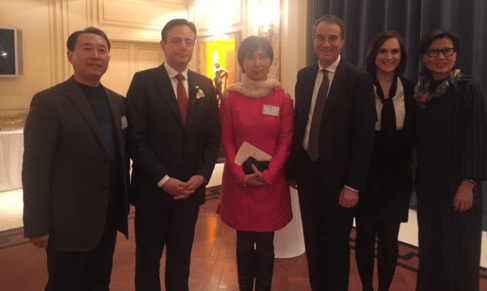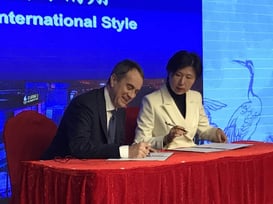
China is no longer the country of mass production; they are looking for added value. The One Belt One Road Dialogues anticipate that change can bring Europe and China together to work on building the future. Dean Paul Matthyssens and Dorinela Munteanu, International Business Director at AMS, tell us about the urgency of the New Silk Road’s developments and appeal to governments and logistic companies to start getting informed. "A truly fantastic story is being written."
The New Silk Road is an important project created by the Chinese government. “A lot of other countries still see it as propaganda, but it will most definitely have an international impact”, Dora says. An upgrading of the labor market leads to an exponential growth in the need for knowledge workers, together with labor costs and a growing demand for Chinese brands from the rising middle class. As the number of branded products increases, China will look for a new market in the West.
"Guanxi is a trust network in which a business partner introduces new partners to you specifically because you’ve proven yourself as a reliable partner over the years."
These developments mean it will be crucial for Europe, and Antwerp Management School, to maintain its relationship with China. “But I do think we’re part of China’s quanxi”, says Matthysens. “Guanxi is a trust network in which a business partner introduces new partners to you specifically because you’ve proven yourself as a reliable partner over the years. It’s all about long-term management in which the partner opens their network to us.” The One Belt One Road Dialogues are a perfect example of how to stimulate that relationship and will probably play an important role.
The European response
The European market has to respond in the right way. There are a lot of logistics and marketing opportunities ready to go, but, according to Matthysens, we have to be open to them. “Everything comes together in the slogan: One Belt, One Road. It’s about different production areas that are connected through various roads, but are all about the same thing: China wants to move towards added value, better products and a new market. A truly fantastic story is being written.
Should the West be nervous? Yes, we should. More engineers graduate there every year than we have in the entire continent of Europe. But that shouldn’t scare you off. Instead, you should profit from it by creating job opportunities: distribution and logistics, packing and unpacking companies. We need to tune our economy to new products and technologies, while maintaining our own quality brands, like Van de Velde, Delvaux, etc.” The reason that the Belgian market has not yet responded, according to Matthysens, is due to the conflicting political positions of trade and infrastructure.
“If your company is active in rail roads, transport, ports, road construction or anything related to these areas, you should at least be aware of what’s going on, not only in China, by the way, but in every ASEAN country,” Dora says. The markets there will be growing at phenomenal speeds in the next few years, and there is a real need for new infrastructure, expertise and training. China sees that opportunity and is preparing for it. European companies should be joining them in that effort.
Getting there
At the end of October, the New Silk Road Business Summit will kick off with three days of training in Shanghai, the starting point of the New Silk Road, the aim of which will be to share knowledge and provide networking opportunities. What is evident is that logistics companies can actually get somewhere in China through this summit.
"Using our broad reach of networks, we can bring government and business representatives and our participants together, allowing us to look at how their businesses can anticipate the current developments."

“Together, we look at which stage the projects are at, how the physical infrastructure is built up and who the investors are. AMS has already carried out a study for the Port of Antwerp about these issues and we want to pass those insights onto our participants in a smaller, more personalized way. Using our broad reach of networks, we can bring government representatives, other top players, and our participants together, allowing us to look at how their businesses can anticipate the current developments. We will visit the Shanghai Port and talk with the Asian Infrastructure Bank, Cosco and internet giant Alibaba. Even if you don’t actively want to trade with China, you will have to deal with their competition when they come our way. How do you plan to deal with that?
Because of AMS’s location in the historical port city, this emphasis on import and logistics is logical. But Matthysens points out that opportunities cannot be created without the cooperation of the big players. “What I think is that officials from all levels should come with us on our mission to Shanghai. But C-levels of B logistics, Proximus, the ports and the big operators in the ports should be engaged as well, so that we have a shared platform and can put together a Belgian strategy. AMS wants to put this together and begin designing the policy alongside the port – Jacques Vermeiren is an important player in that field. We will make sure the bonds are strong, and that something can be built up, but the platform has to be there first.”
Digital infrastructure
Infrastructure is important, but online infrastructure plays a crucial role too. “The Digital Silk Road also exists”, Dora adds. “In China the internet strategy is in full swing. People are living in a different way, digitally. They use ‘We-Chat’ in a different way than we use apps, they use it for everything. It’s really an operation system for your personal life. That’s why the use of digital networks is a lot higher than in Europe. With OBOR (One Belt, One Road, or the New Silk Road Summit), they want to share that expertise with Europe. At the same time, our European companies can get access to the Chinese and Asian markets through the ‘digital trading routes’.”
According to Dora Munteanu, the importance of the summit cannot be stressed highly enough. “They want to use it to pick out likely Belgian and European entrepreneurs. The relationships will be more intensive. The US just backed out of TTIP, which China uses as a means of self-characterization. They are riding the established wave of investment, with the Silk Road as a symbol. Either you participate, or you miss out on opportunities.”
The New Silk Road represents a new stage in Euro-Chinese relations. AMS is organizing the ‘One Belt One Road Dialogues’, a unique business summit, to introduce Belgian companies to the Chinese inner circle, to start building up relationships themselves. Curious to know more about how the relationship between AMS and China blossomed? Read about it here!


